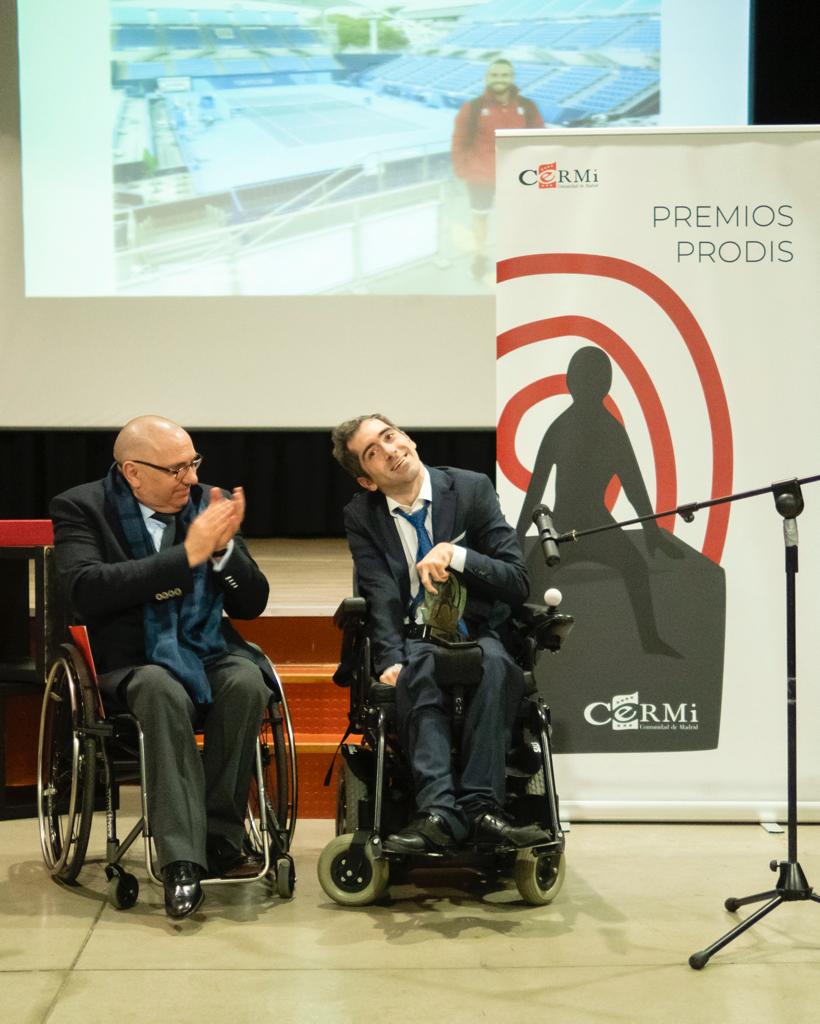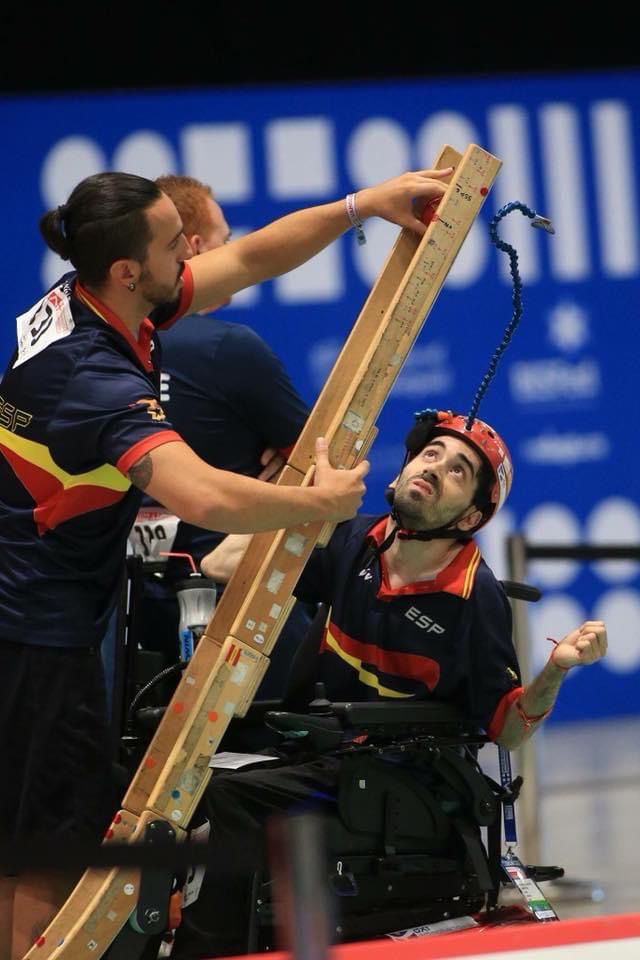“We are not superheroes. We have to tell both the good and the bad” – Javier Martínez on the coverage of adapted sport in Spain

It’s 4pm and Javier Martínez welcomes Sports Gazette from his home in Las Rozas (Madrid), on time, with a smile on his face and eager to talk at length about an aspect he knows perfectly well: the coverage of adapted sport in the Spanish media.
His relationship with this subject began in high school in 2005, when he discovered boccia, a sport that shares similar rules to petanque and is played by people with severe disabilities.
In his case, he has competed at international level in a wheelchair, as he has cerebral palsy since he was unable to breathe for a few minutes during his birth. However, he makes it clear: “My disability only affects me physically and a little in terms of communication. Otherwise, I’m perfect”.
Ever since he took up boccia – which originated in Classical Greece – he realised that nobody was reporting on minority sports, let alone in the field of adapted sport, so he set out to change things.
“I started playing boccia as a way to hang out. It was then that I realised that there was no platform that reported on this type of sports and in 2006 I created a small blog through ‘Hotmail spaces’ where I tried to let people know what was going on there”.
After four years with this small megaphone, he decided to found the website and brand Dxtadaptado.com in 2010. Today, it remains the only platform together with Avance Deportivo that provides complete information on what is happening in Spanish adapted sport, with a focus on the Paralympic movement.
It is particularly in the latter area that the founder of Dxtadaptado.com observes one of the most recurrent mistakes made by the Spanish media when it comes to covering adapted sports:
“The term ‘Paralympic athlete’ is often used wrongly, because a Paralympic athlete is one who has participated in the Paralympic Games.
I have been a boccia athlete and I have competed several years at international level, but I have not been to a Paralympic Games because I have not qualified. In that case, we are talking about an athlete with a disability. You can add ‘elite’ or ‘international’ athlete, but not Paralympic”.
In relation to the Olympics, Javier Martínez says that in Spain, Barcelona 1992 was the key to a radical change in Paralympic communication and that, fortunately, the media have become much more committed to the Games’ news cycle in recent years.
“Before Barcelona 1992, there was no information about the Paralympic Games. On the website I have several reports on Paralympic athletes from 40 years ago and there wasn’t even any news or knowledge.
In Beijing and London there was decent coverage, and in Tokyo, all sports were broadcasted and covered.”
Despite the increase of news regarding this topic, it is true that the path to reach this point has not been easy. Among some of the obstacles have been the lack of preparation of journalists and the Spanish media’s awareness of the need to have professionals specialised in adapted sport.
“Dxtadaptado.com sent two journalists to the Rio 2016 and another two to Tokyo 2020. They told me that the journalists from Marca, Diario AS, Europa Press, EFE… asked them about the schedules or aspects related to the sport they had to cover, such as the medical classifications of the athletes or the rules.
We were surprised because we were the smallest Spanish media to travel to the games and it was the giants who came to us with questions.”
“Now it is different. For example, Marca has a journalist exclusively for Paralympic sport and so does Diario AS. They have realised that they have to have someone specialised or someone who knows a bit about the rules of each sport and its athletes”.

Beyond this step forward, Javier Martínez points out that the coverage of Spanish Paralympic athletes is fleeting and criticises the media for only being interested in what happens at the Games:
“Paralympic journalists don’t just turn up every four years for ten days and then suddenly disappear off the map, they train every day, they compete in many events a year like any other athlete.”
In this sense, he also assures that the low presence of information on adapted sport in Spain is purely due to the low economic return generated by such news.
That is why the Spanish Paralympic Committee makes financial agreements with some media to publish more stories about athletes with disabilities, a way of proceeding that the founder of Dxtadaptado.com does not support:
“Now, there are some media that report on adapted sport because the Spanish Paralympic Committee has reached agreements with them to publish a page or supplement on this topic every week. This information is not entirely independent and objective.
I want news to come out, apart from the economic aspects, for example that a swimmer has won five gold medals at last week’s National Open. That’s news, it doesn’t have to be news because there’s economic interest involved”.
In addition to calling for reporting on what happens in adapted sport in the same way as it is done outside the field of disability, Javier Martínez believes that the media should report on things without giving a victimised or overcoming vision in their information.
“Paralympic sport does not always bring good news. Sometimes, it seems that the media only tells the good news. If there is something bad, it should be reported anyway, that’s it.
In our website, we avoid telling things as if we were superheroes who have come from outside the Earth, although sometimes we have been criticised for it.
For example, if the Spanish Blind Football Team, which has always aimed for medals in all competitions, finishes in sixth place in the European Championship, one cannot avoid saying that it has been a failure, because it is true. On the other hand, the majority of the media report it as a good thing.
It’s like if the Spanish national football team gets knocked out of the World Cup in the round of 16 or the quarter-finals. Would Marca inform about that result as a success then?”
Along with this change of perspective, Javier Martínez also believes that the media should report more on the problems faced by adapted sport in Spain.
Among them, the difficulties in promoting the grassroots and the abysmal difference in economic investment compared to other countries, which then translates into worse results in official competitions.
“In sports like boccia, it’s very difficult for the next generation to grow because in Spain, until you win a medal at a European or World Championships, you don’t get a monetary reward.
The Spanish Paralympic Committee sponsored me one year because we won the silver medal at the European Championships. They gave me €200 a month and €400 to my coach. In places such as Great Britain, France or Greece, coaches are paid €1,500 a month, while here in Spain 99% are volunteers. How are we going to get enough results to go to the Paralympics?”

This lack of financial investment in athletes with disabilities also carries over into other important areas such as education and the world of employment.
Speaking on a national level, he thinks that things need to change so that people with disabilities can contribute more to society, leaving the interview with this message:
“People with disabilities cost the state money, whether we like it or not. But if the state enhances our intellectual capacities, we will stop doing so, because we will be able to find a job and we will pay taxes like everyone else.
We must provide resources for all people to continue studying. And for those who can’t, they should be offered work opportunities, because it will cost the state less than if they were at home or in a residence for the whole day.”